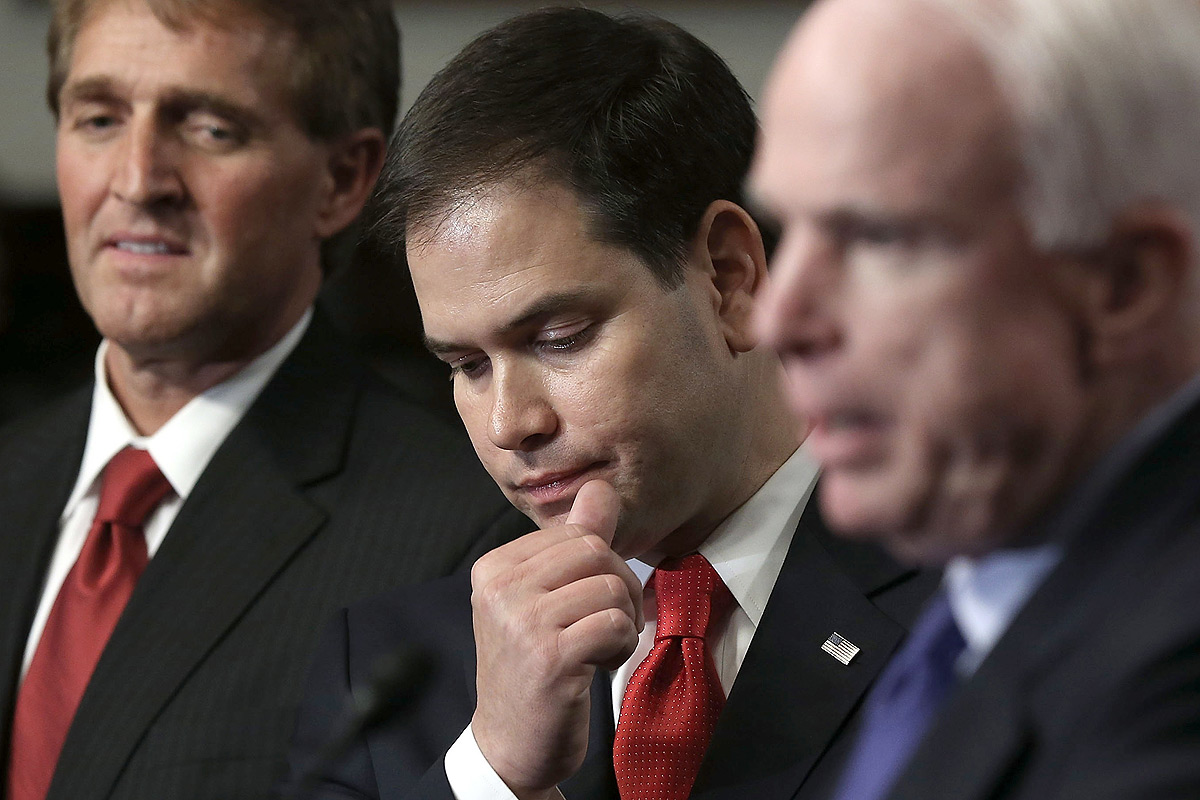Jeff Flake, a former representative and a one-term Republican senator from Arizona, announced his retirement today in a blistering speech on the Senate floor about the state of politics under the Trump administration:
We must never regard as "normal" the regular and casual undermining of our democratic norms and ideals. We must never meekly accept the daily sundering of our country—the personal attacks, the threats against principles, freedoms, and institutions, the flagrant disregard for truth or decency, the reckless provocations, most often for the pettiest and most personal reasons, reasons having nothing whatsoever to do with the fortunes of the people that we have all been elected to serve.
[…]
It is often said that children are watching. Well, they are. And what are we going to do about that? When the next generation asks us, 'Why didn't you do something? Why didn't you speak up?' what are we going to say?
Mr. President, I rise today to say: enough. We must dedicate ourselves to making sure that the anomalous never becomes normal. With respect and humility, I must say that we have fooled ourselves for long enough that a pivot to governing is right around the corner, a return to civility and stability right behind it. We know better than that. By now, we all know better than that.
He got immediate blowback, primarily because of his decision to announce his retirement 14 months before the next election rather than seeking a new term under his stated principles. For instance, Flake also said this (emphasis added):
When we remain silent and fail to act when we know that that silence and inaction is the wrong thing to do—because of political considerations, because we might make enemies, because we might alienate the base, because we might provoke a primary challenge, because ad infinitum, ad nauseum—when we succumb to those considerations in spite of what should be greater considerations and imperatives in defense of the institutions of our liberty, then we dishonor our principles and forsake our obligations. Those things are far more important than politics.
But Flake, who has voted with Trump almost all the time but made no secret of his objections to how the president governs, is stepping down exactly in the face of a primary challenge that has him down substantially in early polls to Kelli Ward, who has the financial backing of rising kingmaker Robert Mercer and the support of Steve Bannon. Just prior to his speech, he told the Arizona Republic that "there may not be a place for a Republican like me in the current Republican climate or the current Republican Party."
There is, of course, one way to find out. Flake is indeed 27 points behind Ward in a recent poll, but the primary is still months away. And Flake's standing in Arizona is complex. As Harry Enten explained earlier this year at FiveThirtyEight, Flake has never been very popular: He just scratched out a win for his Senate seat. Democrats have long eyed Arizona as a potential Democratic pickup in the presidential race—and if Flake struggled, maybe even for a Senate seat.
A very conservative Republican running on that identity, but against Trump, would be interesting. Could he beat out pro-Trump Republicans in the primary? Could he then hang on to his seat in a state potentially flirting with a Democratic breakthrough, and point some way forward for the GOP after Trump?
It's a tall order, but even if Flake failed, continuing to run would reveal important clues about contemporary politics in Arizona and America. Asking him to slog through for an electoral experiment is a lot, but perhaps worth it if the next generation is going to know what to do.
But that's not going to happen; all that's left is Flake's speech and whatever actions he takes as a lame duck.
Nonetheless, his speech isn't nothing. I kept flashing back to an experiment out of the University of Chicago that I've written about before, one that gives some perspective to the changing of norms Flake expressed fear about in his speech. It used a clever setup to see if Trump's popularity and victory wore down norms about xenophobia:
First, knowing that Trump has wide support (either from popularity within the respondents’ states or from winning the election) nudged respondents to care less about preserving the anonymity of their support for an anti-immigration organization.
Second, Trump’s popularity didn’t necessarily make them more xenophobic; the authors argue that, if it had, people making anonymous donations would have increased as well. Instead, it made xenophobes (or those willing to profit in a tiny way from xenophobia), more willing to be open about such a view.
Flake has voted with Trump virtually all of the time. But immigration is a policy he's broken from the president on, not to mention other Republicans—backing low-skill immigration that goes beyond guest-worker programs and would allow immigrant laborers legal pathways to permanent residence. Immigration reform was an early bipartisan effort Flake joined in as a new senator, and he expressed a desire to reboot the attempt, in part to keep his party from bleeding Latino support. The presence of Trump not only stifles such reform, his rhetoric against it seems to raise sentiment against it in the public.
Flake could have done more; perhaps he should have. Or maybe he needs lame duck status to do what he thinks he needs to do. All we have right now are his words—but there's evidence they matter, too.



